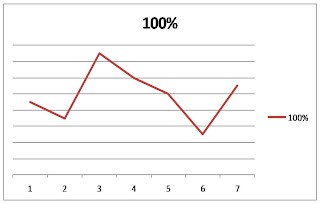 |
| 100% can be a fluid concept. |
‘Do your best’ is a common piece of encouragement, and
it’s a good one: no-one can ask any more of you than your ‘best’.
But sometimes we think we could’ve done better. Maybe an article we’ve written isn’t as good
as a previous one, or we don’t perform as well as we’d hoped in an interview, or perhaps we don’t achieve the grade we wanted in an exam.
We believe we haven’t done our best.
But I don’t think that’s necessarily the case. There are so many factors influencing our
performance: we could be ill at the time (mentally or physically), or we could
have other demands on our time. Perhaps
the cellar flooded or the car broke down, and we lost time sorting it out, or
were flustered when we got to the venue.
It doesn’t even have to be something so dramatic: we could’ve needed to get
the house in order, or have been making an effort to keep friendships and
relationships going.
I’d argue, unless we were sat around eating chips and
playing on the Xbox for 3 weeks beforehand, we still did our ‘best’.
Doing our best doesn’t necessarily mean achieving the maximum
possible result we could under perfect circumstances. Circumstances are rarely perfect, therefore
the maximum possible result is rarely ‘perfection’.
We only get one life, and only one opportunity to do any one
thing. The way things work out is the
only way they could – ‘if onlys’ don’t exist.
So don’t give yourself a hard time if you don’t quite meet
your own high standards every time you do something. The chances are you have done your best with
the circumstances or resources available to you.